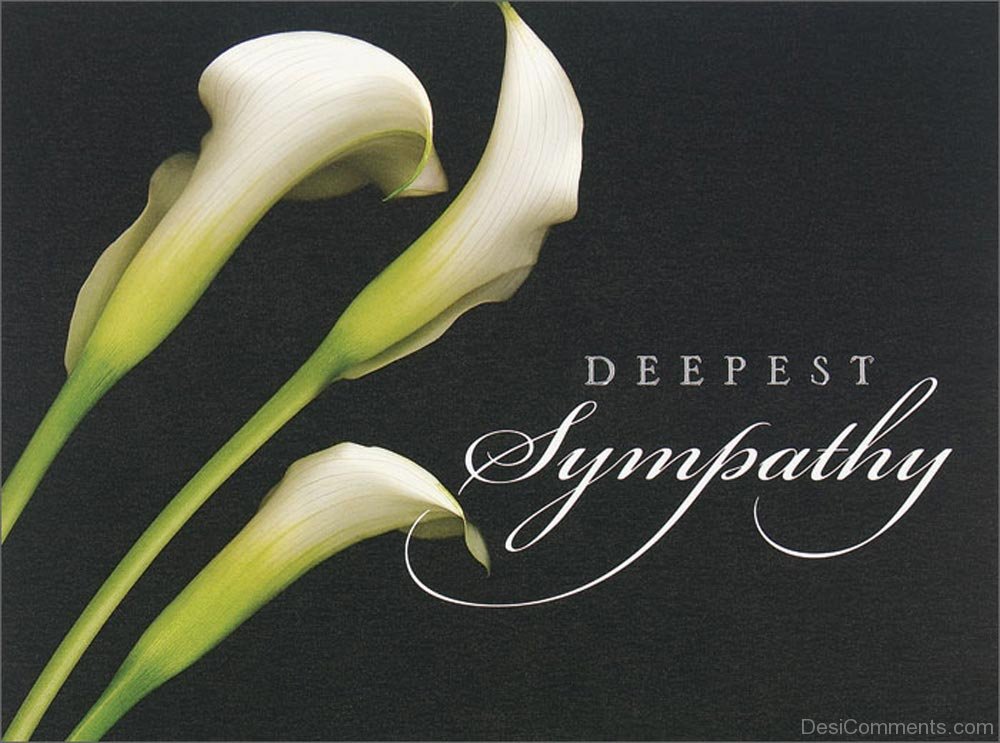In times of loss and grief, finding the right words to express our condolences can be challenging. The phrase "my deepest sympathy" serves as a heartfelt acknowledgment of someone's pain, offering solace during a difficult period. Whether it's the passing of a loved one, a friend, or even a public figure, expressing our sympathy can help bridge the emotional distance between us and those in mourning.
When we say "my deepest sympathy," we not only convey our compassion but also our willingness to support others in times of need. The act of sharing sympathy can take many forms, from a simple message to a more elaborate gesture, but the goal remains the same: to show that we care. Understanding how to navigate these sensitive moments can significantly impact the healing process for those who are grieving.
Ultimately, offering our deepest sympathy is about connection and empathy. It’s essential to remember that everyone grieves differently and that our support can mean the world to those in pain. In this article, we will explore the significance of expressing sympathy, practical ways to offer comfort, and the impact of our words and actions.
What Does My Deepest Sympathy Mean?
When someone expresses "my deepest sympathy," they are acknowledging the profound sorrow and grief that the bereaved is experiencing. It conveys a sense of understanding and compassion, letting the grieving person know that they are not alone in their pain. This phrase is often used in condolence messages, cards, and conversations.
How Can I Express My Deepest Sympathy?
There are various ways to express sympathy to someone who is grieving. Here are some thoughtful approaches:
- Sending a handwritten condolence card that includes "my deepest sympathy."
- Offering a listening ear and being present for the person in need.
- Bringing food or meals to ease their burden during a difficult time.
- Making a donation to a charity in memory of the deceased.
Is it Appropriate to Send Flowers with My Deepest Sympathy?
Sending flowers is a traditional way to express sympathy. They can brighten a somber occasion and provide a small measure of comfort. However, it's essential to consider the preferences of the grieving individual and their family, as some may prefer different gestures instead of flowers.
Understanding Grief: What Are the Stages?
Grieving is a complex emotional process that everyone experiences differently. The stages of grief, as identified by Elisabeth Kübler-Ross, include:
- Denial: Refusing to accept the reality of the loss.
- Anger: Feeling frustration and helplessness.
- Bargaining: Attempting to negotiate a way out of the distress.
- Depression: Experiencing overwhelming sadness.
- Acceptance: Coming to terms with the loss.
How Can I Support Someone in Grief?
Supporting a grieving person requires patience and understanding. Here are ways you can offer support:
- Check in regularly to see how they are doing.
- Respect their grieving process and avoid pushing them to "move on."
- Share memories of the deceased if the person is open to it.
- Encourage them to talk about their feelings and emotions.
What Should I Avoid Saying When Offering My Deepest Sympathy?
While your intentions may be good, certain phrases can be hurtful. Avoid saying:
- "I know how you feel."
- "Everything happens for a reason."
- "At least they lived a long life."
- "It's time to move on."
Personalizing Your Message of Sympathy
When crafting your message of sympathy, consider personalizing it. Mentioning specific memories or traits of the deceased can add a heartfelt touch. Here’s a sample message:
"Dear [Name], I want to express my deepest sympathy for your loss. [Deceased's Name] was a wonderful person who brought joy to so many lives. I will always remember [a specific memory or trait]. Please know that I am here for you during this difficult time."
What Are Some Alternative Ways to Offer Sympathy?
Besides sending messages, consider these alternative methods:
- Creating a memorial video or photo album.
- Organizing a group of friends to volunteer together in memory of the deceased.
- Hosting a small gathering to celebrate the life of the person who has passed away.
How Can I Ensure My Sympathy is Meaningful?
To make your expression of sympathy truly meaningful, ensure that it is heartfelt and sincere. Take the time to listen to the grieving person and tailor your support to their needs. Sometimes, just being there and offering a shoulder to cry on can be the most impactful way to show "my deepest sympathy."
Conclusion: The Importance of Offering Sympathy
Expressing "my deepest sympathy" is more than just a phrase; it is a powerful way to connect with others during their time of grief. By understanding the nuances of grief, offering personalized support, and being present, we can significantly impact the healing journey of those we care about. Remember, your words and actions can provide comfort and remind the bereaved that they are not alone in their struggles.
You Might Also Like
Embracing Simplicity: The Charm Of A Phone Without InternetDeliciously Easy Simple Breakfast Recipes For Everyone
Unveiling The Secrets Behind Brad Pitt's Iconic Physique
Understanding Uni Joint Replacement: A Comprehensive Guide
Discovering The Significance Of Order In Cards: A Guide To Understanding Card Games
Article Recommendations
- Jimmy Garoppolo Girlfriend
- Candice Bergen Health
- Peachykai
- Nicole Weir
- Bradley Rose Age
- Asap Rocky Lip Balm
- Is Barron Trump Gay
- Gal Gadot Dan P Diddy
- Robin Wright
- Simon Cowell Is He Still Alive


